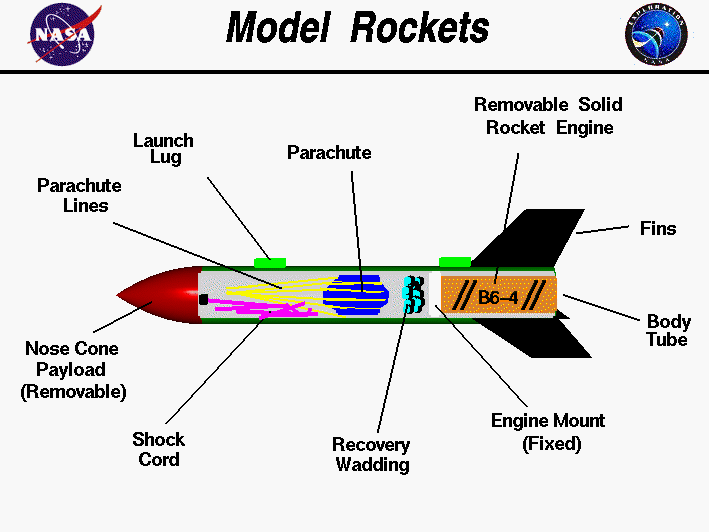I love rockets. My Bachelor's degree is in Aerospace Engineering and I've been interested in rockets since I was a kid. My dad worked on the main engines for the Saturn V rocket when he worked at Pratt & Whitney as a chemist, I've designed and manufactured parts for the space program as an engineer, and my senior project in college was designing a two-state-to-orbit space vehicle (and we got to work with NASA engineers on the project - very cool!). I've found that all kids seem to have some interest in rockets and I use that as a great end-of-the-year project in my physics class.
Today was Rocket Launch Day for my Physics classes. It's the finale to their last project of the year. We launch their rockets multiple times, even having a little fun and doing modifications to the fins and rocket to see what happens. It was slightly overcast with 5-10 mph wind out of the SouthEast, but we only lost two rockets into the trees near the field. We use A8-3 and B6-4 engines, with average impulses of 2.5 N-s and 5 N-s and maximum thrust of 10 N and 12 N, respectively. Average altitudes for these rockets are between 150 and 300 feet.
Here are some pictures some students took from today's launches.
A couple of the students jump when the 1st rocket launches
That's me at the launch controls.
It's a great project to end the year. They learn and have fun all at the same time.
 +
+I found a great resource from NASA - The Rockets Educator Guide - that includes lesson plans and activity ideas. NASA's site is a great resource for this type of project. This guide has some great activities like rockets using film canisters, baking soda, and vinegar, paper rockets, altitude trackers and more. There is even a part on the history of rockets.
The students start the whole unit with a WebQuest on NASA's site about rockets - NASA's Beginners Guide to Rockets: http://www.grc.nasa.gov/WWW/K-12/rocket/index.html This site helps them tie all the physics concepts together and apply them to rockets. It also explains how model rockets work, from the engine propellant and nozzle, to the recovery system and ignition system.

You can extend the unit and do more activities from the educators guide. You can also have students research space missions, current spacecraft, and the future of space travel.
Discovery Education Streaming has some great videos and resources, including the "NASA at 50", "Bill Nye Great Inventions" and "When We Left The Earth: The NASA Mission" series.
The students learn a lot, see an application of what they have learned, work as a team, and have some fun. It's a great way to end the year.
Topics in this unit:
history of rockets
transportation
energy transformations
fluid dynamics
thermodynamics
aerodynamics
chemistry of solid fuel engines
stability
Newton's Laws
Gravity
air resistance
Skills:
Teamwork
communication
reading comprehension
manual dexterity
application of knowledge
problem solving
math
Resources needed:
computer with internet to connect to NASA website
NASA Rockets Educator Guide - free
Model rocket kits, engines, and launcher (available from a variety of companies and suppliers. I use Estes).
(funding for these supplies have been through Donor's Choose and an Air Force Association classroom grant).
Rockets resources:
NASA's Beginners Guide to Rockets: http://www.grc.nasa.gov/WWW/K-12/rocket/index.html
Estes Model Rockets - Educator Page: http://www.esteseducator.com/
Apogee Rockets - http://www.apogeerockets.com/ (click on "Educational")
National Association of Rocketry: http://www.nar.org/teacher.html
Fly Rockets: http://www.flyrockets.com/
NASA Educator's Resource Centers http://www.nasa.gov/audience/foreducators/k-4/learning/F_Educator_Resource_Center_Network.html




.jpg)





0 comments:
Post a Comment